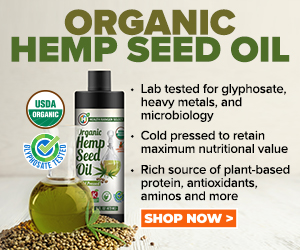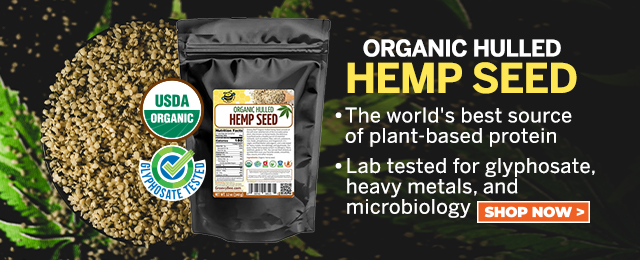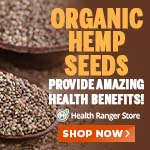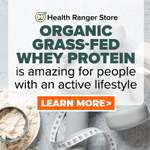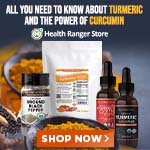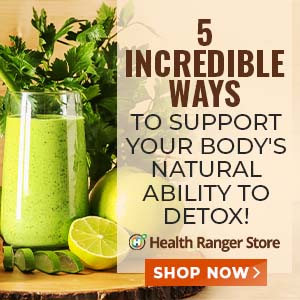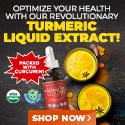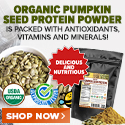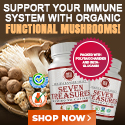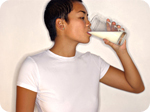
What's best? Soy milk, cow's milk, raw milk and fermented milk (kefir)
 Tuesday, August 21, 2007 Tuesday, August 21, 2007by Mike Adams, the Health Ranger Editor of NaturalNews.com (See all articles...) Tags: dairy products, cow's milk, almond milk |
- Hidden poison in your medicine and supplements: How phthalates in capsules are silently attacking your heart, thyroid, and hormones
- X-class solar flare sparks worldwide disruptions, with more storms expected as sunspot turns toward Earth
- HHS launches Generation Gold Standard, ushering in UNIVERSAL FLU VACCINE spearheaded by Bill Gates
- EU court exposes secret Pfizer deal, orders von der Leyen and Bourla to reveal concealed texts
- OUTRAGE: Georgia shields pesticide giants from cancer lawsuits as corporate lobbying silences victims
- Renegade cardiologist joins MAHA, demands immediate halt to mRNA vaccines and overhaul of US health policies
- Breakthrough study links mRNA vaccines to irreversible female fertility loss
- When the storm brings spies: How a top weather app became an agent of surveillance
- FDA cracks down on unapproved fluoride drugs for kids as science exposes decades of deception
- Hidden betrayal: Moderna and Pfizer shots hijack immune cells to rewrite mRNA, prolonging spike protein production
- Lard: A highly nutritious but misunderstood superfood
- The great awakening: How people are questioning power structures and embracing truth
- Judge rules Kansas vaccine lawsuit against Pfizer must proceed in state court
- CLIMATE PONZI SCHEME DENIED: Trump begins the exit of the BIGGEST WASTE of money, resources and human lives ever and the climate alarmists are freaking out
- CHILD mRNA DEATH JABS: 'Smart Moms Ask' healthcare group launches campaign to stop injecting children with the deadliest "vaccine" ever created
- Breakthrough study reveals how Epstein-Barr and a gene variant heighten multiple sclerosis risk
- The mouth-brain connection: Could dental health guard against dementia (and vice versa)?
- Health Ranger Report: Dr. Alphonzo Monzo discusses nanotechnology, 5G and the weaponization of health
- WAR ON COGNITION: The Coordinated Assault on Your Brain and How to Defend Yourself Against Every Attack
- Singapore's draconian vaccine mandate: Citizens face jail time for refusing FORCED medical procedures that do HARM
- Big Pharma's Dirty Secret: How Prescription Drugs Are Starving Your Body of Essential Nutrients
- Canada's COVID cover-up: Health officials swore secrecy to protect Trudeau from vaccine scandal
- RED ALERT: Nuclear War Between India and Pakistan Could Trigger Global Catastrophe… full RISK ANALYSIS
- JESUS NEVER SPOKE ENGLISH: Historical facts on why the Bible you’re probably reading has been altered, redacted or hidden from much of its original meaning
- Gene-edited pork sneaks onto your plate: FDA quietly approves CRISPR pigs amid health and ethical concerns
- Silent catastrophe: COVID-19 vaccines linked to plummeting fertility rates, Czech data reveals
- Why All Government Officials and Big Tech CEOs Who Engage in Systematic Viewpoint Censorship Must Be ARRESTED, Prosecuted, and Sentenced to Life in Prison
- Brushing with poison: Study finds toxic heavy metals in 90% of toothpaste brands, including those for children
- Survival basics: 5 Dangerous locations to avoid during an EMP attack
- BBC accused of “political censorship” for shelving Gaza documentary amid mounting pressure
- EU embraces censorship over solutions as energy grid crises spark blackout fears
- Health Ranger Report: Christopher Bjerknes challenges conventional narratives about world history
- Australia’s vaccine cover-up: 35 died same day as COVID shot, but authorities ignored them
- Landmark study of 85 million reveals shocking surge in heart attacks, strokes, and sudden death following the notorious COVID-19 jab
- Hidden poison in your medicine and supplements: How phthalates in capsules are silently attacking your heart, thyroid, and hormones
- The truth about Benzyl Alcohol in beauty products
- The Miraculous Healing Power of DMSO: Nature's Forgotten Cure for Cancer, Pain, and Regeneration
- Biblical truth: God will carry out a “cosmic reset” of Earth and destroy all human civilization with a series of extinction-level cosmic impacts known as The Seven Trumpets, Seven Bowls and Seven Seals
- URGENT REPORT: The China Import Embargo - What to Stockpile Now Before America Runs Out
- The Ultimate Survival Guide to Baking Soda: A Miraculous, Multi-Purpose Remedy for Health, Home, and Emergency Preparedness
- Widespread social and economic unrest: Steve Quayle issues urgent financial warning of imminent asset collapse in new interview with Mike Adams
- Aerosolized bioweapons? Strange “diploid biomasses” falling out of the sky in Florida captured under the microscope
- A call to preserve America’s future: “Defeating Big Government Socialism” by Newt Gingrich
- Stunning Visualization of the Seven Trumpets in the Book of Revelation
- Big Pharma launches “Vaccine Integrity Project” to combat Secretary Kennedy and keep 94 shots going into kids with mandates and liability protections
- World Economic Forum's current downfall exposes legacy of totalitarianism, financial fraud, and crimes against humanity
- Biden regime deployed over 600 grants to fund disinformation agenda, to silence the truth and stifle debate
- The Miraculous Healing Power of Green Tea: Unlocking the Potent Antioxidants That Big Pharma Doesn't Want You to Know About
- The unspoken truth about chemotherapy: These “treatments” create toxic time bombs in your body called CELL-KILLING PARTICLES
- U.S. Government's Bio-War Against America: 15 Historical Medical Horrors Inflicted on the American People by the Government Itself
- A win for free speech: State Department SHUTS DOWN controversial disinformation office
- U.S. demands U.K. protect FREE SPEECH, repeal hate speech authoritarianism, in latest trade deal negotiations
- French rioting demonstrates how gun control laws are failing law-abiding citizens
- Head of L.A. Port warns of incoming plunge in U.S. supply chain, empty shelves and inventory depletion in 5-7 weeks
- Red Cross issues warning to stop blood plasma donations from vaccinated people
- Scientists confirm: GENIUS brain function can be spontaneously unleashed in humans without any apparent cause
- EPA advisor admits the agency is funneling billions to climate groups ahead of Trump’s return to White House
- HYSSOP: What research reveals about the health benefits of this ancient holy herb
- Two containers with completed ballots fall out of truck in Florida
- Newly released JFK files reveal Pentagon's role in creating Lyme disease and covid in the same lab
- Mike Adams releases country western hit single: Goin’ Back in Time is Comin’ Home
- Global leaders unite to clamp down on “misinformation” with UN-backed Cascais Declaration
- BREAKING: 2025 NDAA authorizes mandatory military draft of WOMEN across America… as Pentagon pursues global NUCLEAR war with both Russia and China at the same time
- I Want My Bailout Money – new song released by Mike Adams
- Michael Yon warns of a ZIONIST TAKEOVER in Trump’s second administration
- Ozempic and Wegovy weight loss drugs are injectable LIZARD VENOM PEPTIDES that may unleash a devastating wave of organ failure… side effects align with symptoms of SNAKE BITES
- The Health Ranger releases “Vaccine Zombie” song and music video, using AI-animated zombies for the music video
- BOMBSHELL: DNA testing kits are a SCAM to develop ethnic-specific bioweapons
- These 13 countries just signed an agreement to engineer a global FAMINE by destroying food supply
- Israeli soldiers accused of even more torture and abuse in the West Bank
- RFK Jr. clears key hurdle: Sen. Susan Collins backs controversial HHS nominee, signaling a new era for health policy
- Sermon 30: How Jesus reveals Caesar’s FAKE CURRENCY and FALSE AUTHORITY
Thumbs down: Soy milk
A few years ago, I recommended soy milk as a natural alternative to cow's milk. But since then, far better alternatives have emerged (see below). Also, more information has appeared regarding the environmental impact of soybean farming (the Amazon rainforest is being devastated by clear cutting to create soybean agricultural lands) as well as the frightening fact that most soybeans grown today are genetically modified (GMO) varieties.On top of this, most popular soy milk brands (I won't name names, but these are likely the ones in your grocery store) have been bought out by big, profit-seeking food and beverage corporations, and as a result, they've been sugared up and made nutritionally inferior. Check the ingredients on "plain" soy milk the next time you're at the store: It's loaded with sugar!
Without question, most soy milk has become too mainstream, too sugary and too much controlled by the same food and beverage giants that are still manufacturing and marketing other products that promote degenerative disease. Because of these reasons, I no longer recommend soy milk (unless you make it yourself or get it from a small, truly natural company).
Thumbs down: Processed cow's milk
I'm also not thrilled about processed milk from cows. By "processed," I mean homogenized and pasteurized. The pasteurization kills all the beneficial microorganisms, and homogenization artificially modifies dairy fats in a way that ultimately harms the human cardiovascular system when consumed. Processed "mainstream" milk is also taken from dairy cows pumped up with antibiotics, rBGH (Bovine Growth Hormone) and usually treated very poorly in terms of ethics. Even the popular brands showing happy cows and claiming to be organic are under intense fire by the Organic Consumers Association (www.OrganicConsumers.org) for exploiting certain loopholes that allow non-organic cows to be suddenly considered "organic" on the day they're giving milk.Processed cow's milk is bad for your health and bad for the cows who give it. It's great for corporate profits, however, and that's why milk continues to be so heavily marketed as a nutritional beverage. They've even managed to so strongly influence the USDA that the latest dietary recommendations by this government agency essentially recommend that everyone should drink more milk. And it's no surprise that infant formula manufacturers have, for decades, tried to convince nutritionally ignorant mothers that cow's milk is better for their baby than human breast milk. (An odd idea, isn't it?)
Thumbs up: Raw milk
Over the last two years, I've become a proponent of raw milk (especially raw fermented milk, see below). Raw goat's milk is my personal recommendation, but even raw cow's milk has merit. What's so good about raw milk? Because it's not homogenized or pasteurized, it's nutritionally superior to dead, cooked milk. Raw milk seems to be far easier to digest, and it contains living bacteria cultures that enhance digestion and even soothe the digestive tract.It's no surprise, then, that raw milk is under attack by both federal regulators and some members of the processed milk industry. They don't want people to find a "superior" milk that isn't as profitable to sell (because it has reduced shelf life), so they're trying to destroy the raw milk market and limit consumer choice to processed, dead milk. (The same is true in the almond industry, where the Almond Board of California is now trying to irradiate all almonds grown in the state, yet have them labeled as "raw" even when they're dead.)
This attack on raw milk is dressed up to look like a public safety concern. Raw milk is dangerous, regulators claim, because the live cultures might get contaminated with unfriendly bacteria and harm someone. The preferred alternative, it seems, is to kill all the food so that it harms everyone equally.
In terms of choosing raw milk, the typical choices are raw cow's milk and raw goat's milk. Raw goat's milk is more compatible with human nutritional needs (and is especially beneficial to infants when mother's milk isn't available), but it has a stronger taste that not everyone enjoys. I encourage you to try both raw goat's milk and raw cow's milk, then decide what you like best. The proteins in the goat's milk are, no doubt, easier for humans to digest.
Thumbs way up: Fermented raw milk
The best dairy beverage for your health is, in my opinion, fermented raw milk. If you take raw milk and inoculate it with bacterial cultures, then let it sit for a day or two, you end up with a living, predigested, nutritionally superior beverage that's so packed with life it's actually fizzy (carbonated due to the off-gassing of bacteria) when you make it yourself at home.One form of this fermented milk is called Kefir. It's an incredible beverage when you make it yourself. The store-bought kefir just isn't the same because it's usually dead, flat and pasteurized. But home-made kefir is something else entirely! It's alive, energetic and completely natural.
I was recently treated to some kefir made from raw goat's milk by a raw foods chef in Tucson -- a man I hope to feature on NewsTarget videos later this year. He makes kefir in jars on his kitchen countertop, using a kefir culture that's been passed down from one raw foodist to another for years... maybe even decades. It contained no sweeteners or additives of any kind; just raw goat's milk cultured with bacteria. After drinking it, I noticed an immediate energetic difference, and in the days that followed, I was amazed at the therapeutic effect on my digestive and eliminative processes. Since then, I've really upped my intake of fermented foods in general.
Store-bought kefir is tricky. Definitely avoid non-organic kefir of any kind, and I strongly recommend that even when you buy organic kefir, avoid products made with added sugars. This is a fermented beverage, not ice cream. Don't think it's supposed to taste like a milkshake. It's a slightly bitter beverage when you drink it plain, but that's what kefir is supposed to be.
Thumbs way up: Raw almond milk
Another current favorite at my house is raw almond milk. It's made from raw, soaked almonds, water, vanilla and a pinch of sea salt. I've posted a video on how to make this yourself using a Vita-Mix. (Click here to see the video.)Raw almond milk is both delicious and nutritious. While it doesn't have the protein content of animal milk, it's rich in plant-based fats and various anti-cancer phytonutrients. Once you make a batch, you'll need to drink it within a day or two, since it tends to sour very quickly (it's alive, raw and nutritious, obviously), but I've found that you can preserve it in the refrigerator for several days longer by adding a couple of drops of food-grade hydrogen peroxide.
Many raw food proponents are now drinking a combination of raw almond milk and raw goat's milk kefir. That's a combination I'm enjoying, too. It's good to have a balance of both plant and animal-based milks, but only if they're from ethically treated, naturally raised animals who are not exposed to antibiotics, toxic chemicals or conventional veterinary care (which is all based on chemicals, just like human health care).
Mike's Milk Matrix
Okay, here's the low down on milk products and milk alternatives as I see it:Soy milk: Not recommended. Too many GMO soybeans, bad environmental impact and some possible undesirable estrogen effects. The isoflavones are good for preventing cancer, however.
Processed cow's milk: It's just gross. Homogenized, pasteurized, milked from unhealthy cows and containing alarmingly high levels of pus, this liquid is nothing less than frightening. Flee it.
Raw cow's milk (organic): This is an acceptable dairy beverage. If it's from healthy cows treated with kindness and good nutrition, this raw beverage is far better than processed cow's milk.
Row goat's milk (organic): Even better than raw cow's milk, since the goat's milk is easier to digest and more compatible with human nutritional needs.
Fermented milk from cows or goats (organic Kefir): A great choice! It's alive, nutritious and great for digestive health. Make it yourself for best results. If you buy it, avoid the sugared-up kefir products in the store.
Raw almond milk: A top choice for vegans, one of my favorite beverages. Make it yourself with raw almonds, water a nut milk bag and a blender. Click here to see my almond milk recipe video.
Enjoy!
Dairy products at FETCH.news
Get independent news alerts on natural cures, food lab tests, cannabis medicine, science, robotics, drones, privacy and more.
 About the author:Mike Adams (aka the "Health Ranger") is a best selling author (#1 best selling science book on Amazon.com) and a globally recognized scientific researcher in clean foods. He serves as the founding editor of NaturalNews.com and the lab science director of an internationally accredited (ISO 17025) analytical laboratory known as CWC Labs. There, he was awarded a Certificate of Excellence for achieving extremely high accuracy in the analysis of toxic elements in unknown water samples using ICP-MS instrumentation. Adams is also highly proficient in running liquid chromatography, ion chromatography and mass spectrometry time-of-flight analytical instrumentation.
About the author:Mike Adams (aka the "Health Ranger") is a best selling author (#1 best selling science book on Amazon.com) and a globally recognized scientific researcher in clean foods. He serves as the founding editor of NaturalNews.com and the lab science director of an internationally accredited (ISO 17025) analytical laboratory known as CWC Labs. There, he was awarded a Certificate of Excellence for achieving extremely high accuracy in the analysis of toxic elements in unknown water samples using ICP-MS instrumentation. Adams is also highly proficient in running liquid chromatography, ion chromatography and mass spectrometry time-of-flight analytical instrumentation.
Adams is a person of color whose ancestors include Africans and Native American Indians. He's also of Native American heritage, which he credits as inspiring his "Health Ranger" passion for protecting life and nature against the destruction caused by chemicals, heavy metals and other forms of pollution.
Adams is the founder and publisher of the open source science journal Natural Science Journal, the author of numerous peer-reviewed science papers published by the journal, and the author of the world's first book that published ICP-MS heavy metals analysis results for foods, dietary supplements, pet food, spices and fast food. The book is entitled Food Forensics and is published by BenBella Books.
In his laboratory research, Adams has made numerous food safety breakthroughs such as revealing rice protein products imported from Asia to be contaminated with toxic heavy metals like lead, cadmium and tungsten. Adams was the first food science researcher to document high levels of tungsten in superfoods. He also discovered over 11 ppm lead in imported mangosteen powder, and led an industry-wide voluntary agreement to limit heavy metals in rice protein products.
In addition to his lab work, Adams is also the (non-paid) executive director of the non-profit Consumer Wellness Center (CWC), an organization that redirects 100% of its donations receipts to grant programs that teach children and women how to grow their own food or vastly improve their nutrition. Through the non-profit CWC, Adams also launched Nutrition Rescue, a program that donates essential vitamins to people in need. Click here to see some of the CWC success stories.
With a background in science and software technology, Adams is the original founder of the email newsletter technology company known as Arial Software. Using his technical experience combined with his love for natural health, Adams developed and deployed the content management system currently driving NaturalNews.com. He also engineered the high-level statistical algorithms that power SCIENCE.naturalnews.com, a massive research resource featuring over 10 million scientific studies.
Adams is well known for his incredibly popular consumer activism video blowing the lid on fake blueberries used throughout the food supply. He has also exposed "strange fibers" found in Chicken McNuggets, fake academic credentials of so-called health "gurus," dangerous "detox" products imported as battery acid and sold for oral consumption, fake acai berry scams, the California raw milk raids, the vaccine research fraud revealed by industry whistleblowers and many other topics.
Adams has also helped defend the rights of home gardeners and protect the medical freedom rights of parents. Adams is widely recognized to have made a remarkable global impact on issues like GMOs, vaccines, nutrition therapies, human consciousness.
In addition to his activism, Adams is an accomplished musician who has released over a dozen popular songs covering a variety of activism topics.
Click here to read a more detailed bio on Mike Adams, the Health Ranger, at HealthRanger.com.
Take Action: Support Natural News by linking to this article from your website
Permalink to this article:
Embed article link: (copy HTML code below):
Reprinting this article:
Non-commercial use OK, cite NaturalNews.com with clickable link.
Follow Natural News on Facebook, Twitter, Google Plus, and Pinterest
Science News & Studies
Medicine News and Information
Food News & Studies
Health News & Studies
Herbs News & Information
Pollution News & Studies
Cancer News & Studies
Climate News & Studies
Survival News & Information
Gear News & Information
News covering technology, stocks, hackers, and more



"Big Tech and mainstream media are constantly trying to silence the independent voices that dare to bring you the truth about toxic food ingredients, dangerous medications and the failed, fraudulent science of the profit-driven medical establishment.
Email is one of the best ways to make sure you stay informed, without the censorship of the tech giants (Google, Apple, Facebook, Twitter, YouTube, etc.). Stay informed and you'll even likely learn information that may help save your own life."
–The Health Ranger, Mike Adams











